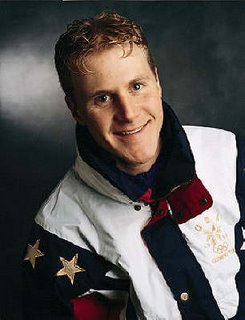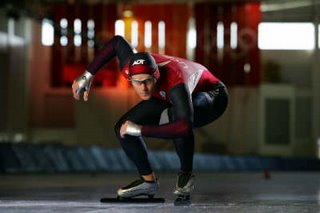


Okay, okay, I admit that in the past I have profiled athletes that weren't so awesome. Eh hem...cough...cough.....Floyd Landis. I am still shocked and dissapointed to know that Floyd tested positive for performance enhancing drugs after the Tour de France. I do have to make a small note that a recent article came out that the French laboratory made an administrative error in testing Landis' B Sample. Click here for the full report.
BUT I am not here to blog about Floyd Landis, I am here to blog about a truly extraordinary and bloggable athlete named Casey FitzRandolph. (I gave Casey my blog address so he may be blushing at this point. Or at least I hope he's not getting out his hunting crossbow. Eeck!)
Yes, I am here to talk about Casey FitzRandolph, with whom I had an amazing conversation with just two days ago. You can click here to go to his official website to learn more about his speedskating career.
So how and why did I get in touch with a speed skater from the winter olympics?
Well, a while back I was talking to the USOC sports psychologist that I work with and she mentioned that my issues with fencing were similar to another athlete she read about, Casey FitzRandolph. Then she suggested that we talk and the rest is blog history.
Let's see...I can see where she sees some similarity. Casey started skating at age 4 and I started fencing at age 6. Casey was a winning athlete throughout his career until he hit a wall when a new type of skate was implemented, starting to sound familiar? At the time the switch came about Casey was at the top of his game in the world rankings and after the change he fell significantly in the rankings. While it seemed everyone around him was quickly adapting, Casey was still adjusting to the new skates. The story turns out really well for him because he does eventually break through and win a gold medal at the 2002 Salt Lake City Games. I am still on the upward hill of getting used to the new rules of fencing and my story is yet to be written-that is the only difference.
I needed to talk with Casey about the nitty gritty. What was it like to train with athletes that were younger and lose to them repeatedly in practice? Were there days where you thought you could never be good again? What was it like to humble yourself and essentially start over in a sport that you thought you knew like the back of your hand?
The answers he gave? Are you ready for it?
The first answer is HARD WORK. Yeah, who would of thought, trying to be the top in the world is hard work. His mental focus changed after the Nagano Olympics in 1998 to become more about the process and the work it took to perfect his skating technique. He said he worked harder during that period of his career than at any other time.
The other answer he gave was equally as important. He shifted his focus from the medal stand to "being the best that Casey can be". He trained every single day and competed each time with that mentality.
I actually wrote out my version of "be the best Casey can be" and posted it in my locker. The sign reads, "be the best that Iris can be". Yes, I know what you're thinking, "Iris, how much time did it take you to come up with something so original yet stay true to Casey's thought process?" It was tough but it's all about hard work.
So what is "being the best that Iris can be", besides sounding like something from an army recruitment ad? In my mind it means going into practice each day and squeezing out every ounce of my ability because in the end that's all we can truly ask of ourselves.
In Casey's case he worked his way back up and eventually reached the ultimate goal of an Olympic Gold medal. That prompted me to ask, "Casey, at what point did you know that you could be up there and did you trust that you would get there?" His answer was that he worked very hard and had blind faith that the technique would come through, but the goal always remained "be the best that Casey can be on that day and in that moment".
His advice to me at the end of our conversation was to humble myself and start from the beginning. I should take one step at a time in small increments and eventually it will all come together. I didn't have the heart to tell him that I have the patience of a two year old but I get the point. It takes hard work and time-and even then the goal is still about being present in the process.
The best part of talking to Casey was the fact that two people from very different sports could relate to each other about their experiences. I am very grateful for our conversation.
Thanks, Casey!

No comments:
Post a Comment